OUR BURNING PLANET 168
‘Show us the money from our Mountain, SANParks’
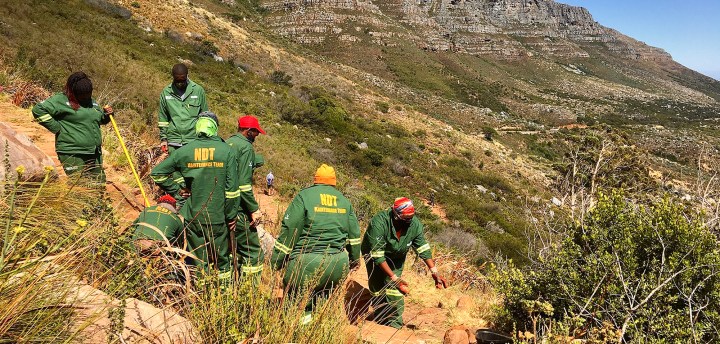
Irregular spending of R200-million at SANParks – the national parks entity – trumps profits that have poured out of Table Mountain. Livid locals want the big chiefs to explain what they have done with the ‘cash cow’s’ funds.
First published in the Daily Maverick 168 weekly newspaper.
Recreational users of the Mother City’s most famous landmark have demanded answers to questions about a deluge of surplus revenue that has left the reserve, apparently buckling under a mountain of problems.
Proclaimed in 1998 to conserve the iconic fynbos biome, and run by government entity SANParks (South African National Parks), Table Mountain National Park in 2018/19 earned about R308-million. Key expense items – says environment minister Barbara Creecy’s November 2019 reply to a parliamentary question by the Democratic Alliance – were only R123-million, including R90-million in operation costs.
So, where are the rest of the golden goose’s eggs being fried?
Those eggs – worth a surplus of about R185-million in 2018/19 – could have been directly reinvested into the park, but local campaigners say they have seen scant evidence of that.
“There is an awful lot of money generated by this park that is not coming back into it,” argues Nicky Schmidt, a campaigner with a track record of winning against SANParks in the Supreme Court of Appeal.
And, while “an awful lot of money” might have watered other pastures, an even bulkier amount than 2018/19’s surplus has been spent through procurement irregularities within SANParks, the national parks entity charged with managing 20 parks throughout the country – including the Cape Peninsula’s stunning Table Mountain chain.
Daily Maverick/Our Burning Planet can now reveal that SANParks failed to stop irregular expenditure amounting to about R200-million. The exact irregular amount of R202,237-million – compared with about R3-billion in total revenue in 2019/20 – is about R17-million more than the R185-million surplus referenced in the minister’s parliamentary reply.
“Effective and appropriate steps” had not been taken, which could have prevented procurement processes at SANParks “not being followed during previous financial years”, according to the Auditor-General’s findings in SANParks’ 2019/20 annual report.
This procurement spree was only “identified in the current period”.
And the unidentified big spenders, the Auditor-General says, have so far escaped censure – yet irregular spending exceeding R200-million in the organisation at large not only trumps the funds that have left the mountain, a moneyspinner in good years.
It outstrips by nearly R20-million (R18,554,147) critical expenses such as the 2019 national anti-poaching budget: about R184-million. In 2018, the anti-poaching budget was about R190-million. Shocking official population statistics strongly suggest there are now simply fewer rhinos to poach in national parks, contradicting Creecy’s annual narrative that South Africa is winning the war against poachers.
“I was unable to obtain sufficient appropriate audit evidence that disciplinary steps were taken against officials who had incurred irregular expenditure,” the Auditor-General cautions. “This was due to proper and complete records not being maintained.”
In February, Daily Maverick contributor Don Pinnock also revealed “unauthorised, undocumented and wasteful spending” totalling nearly R3-billion by the Department of Environment, Forestry and Fisheries (Deff) – the state entity that oversees SANParks.
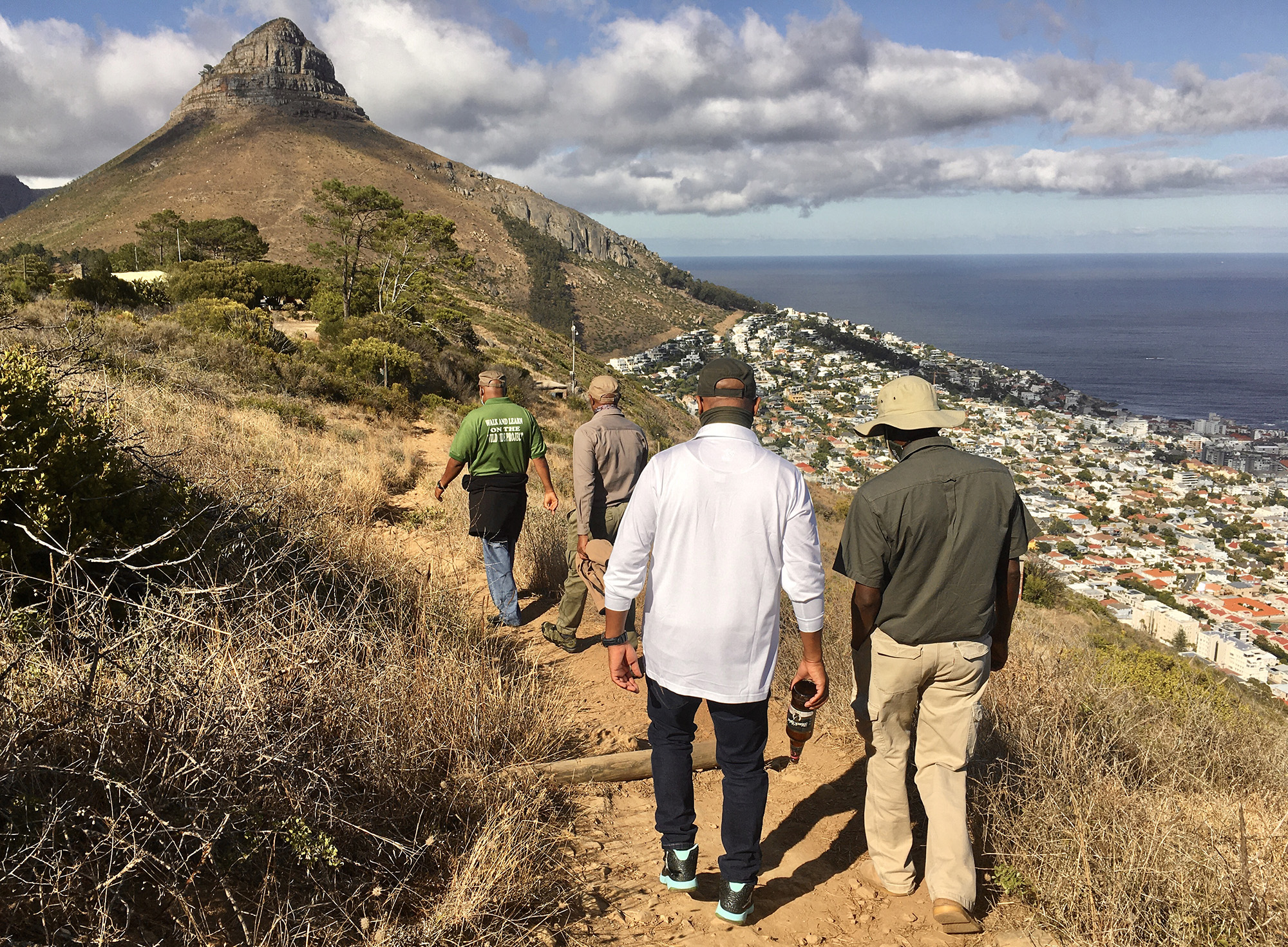
SANParks officials Xolani Nicholus Funda, area-integrity manager; Ike Phaahla, spokesperson; Rey Thakhuli, acting communications head; and Ezekiel Kosa, the park’s marine-conservation manager, stroll between Table Mountain crime hotspots Lion’s Head and Signal Hill. (Photo: Tiara Walters)
A R2-billion security wish list
Now Friends of Table Mountain (FoTM), a non-profit umbrella group, has joined forces with Schmidt to demand the minister intervene in the park’s conservation, security and tourism quandaries. Chair of user-safety non-profit group Parkscape, Schmidt in 2018 won with costs in the Supreme Court after the park had failed to consult communities about felling Tokai’s alien-pine plantation, a popular local recreational area.
The lobby coalition’s latest series of calls follow task-team negotiations with SANParks – at Creecy’s behest – yet the campaigners maintain the minister and other civil servants responsible for the park’s upkeep have failed to address an escalating situation here: this includes hyperviolent crime in a reserve inscribed on the World Heritage List.
In a January letter to the minister, the lobby coalition provided her with an action plan that it says would bring “significant positive change” – if implemented. Among others, the coalition wants:
- The park’s income to stay in the park while it is “renewed”;
- “Sustainable business opportunities”;
- More safety rangers (the park has 118 rangers, not all working at once), as well as the return of the disbanded canine unit;
- An “immediate” and “effective” security hotline; a “more formal” neighbourhood watch; a “reinstated” park forum; and
- A comprehensive volunteer programme tapping into the public’s “general desire” to help with issues such as pervasive litter, trail degradation and tree bark-stripping.
Recent crimes on the mountain, FoTM chair Andy Davies says, include “the severe Tafelberg Road incident in which two joggers were attacked by knife-wielding assailants” in early February. The incident took place near the cableway station.
To unveil its safety and security plans, and demonstrate the challenges of patrolling varied wild terrain on a heavily populated metropolitan edge, SANParks recently held multiple press briefings in the park.
According to SANParks, “overspill of urban crime is a phenomenon common to all urban national parks”, whether in Rio’s Tijuca or San Francisco’s Golden Gate. It says the challenge is “more extreme in open-access urban parks”.
During the next 15 years, “American and European” donors would likely have to mobilise some $144-million (R2-billion) for far-reaching security upgrades in the park – featuring, among others, a new flagship mega joint-operations centre and a beefed-up surveillance network.
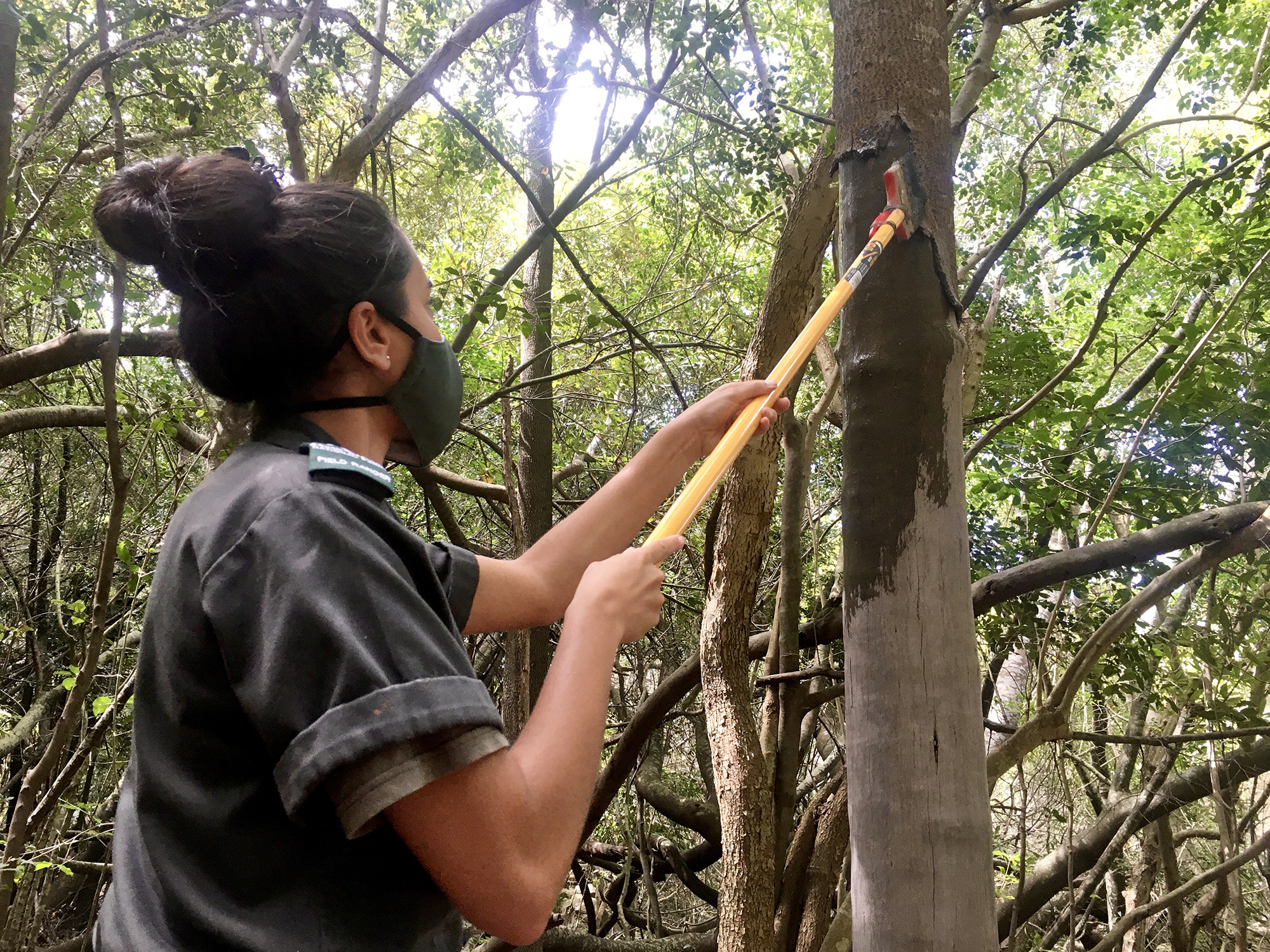
Newlands forest ranger Nabeelah Adams treats a bark-stripped tree with cow manure, which the park hopes will infuse enough nutrients into the tree to ensure bark regrowth. Manure treatment is in its experimental phases, says Adams, and its efficacy is yet to be confirmed. (Photo: Tiara Walters)
Super security nerve hub
This centre is being designed to act as the emergency nerve hub and main intelligence-gathering node, dispatching resources to areas of concern, SANParks acting communications head Rey Thakhuli told Daily Maverick. The park started this “complex” conceptual process two years ago, “and is now reaching the implementation phase due to donors coming onboard”.
Thakhuli says the park also has “ongoing” and “collaborative operations with other security partners”, such as City of Cape Town law enforcement, the South African police, the navy and private security.
Among recent crime-fighting successes quoted by SANParks are “Table Mountain killer” Blessing Bveni’s sentence of two life terms for the Silvermine murders; the Cape Point arrest of 10 suspected abalone poachers; the Rhodes Memorial arrest of three suspected armed bark-strippers wielding nearly 60kg of boekenhout (Cape beech); as well as the Kleinplaas Dam arrests near Simon’s Town. Here, rangers in February detained two suspects and handed them to police for possessing drugs and dangerous weapons.
And SANParks area-integrity manager Xolani Nicholus Funda, formerly chief ranger, says he wants dogs back in the park as crime-fighting “game-changers”. Besides, Funda insists, SANParks has exactly the kind of track record it needs to show it is an effective deployer of donor money. A non-profit company offering tax benefits will handle donor funds.
On holding to account those responsible for irregular expenditure within the greater national parks entity, chief financial officer Dumisani Dlamini says they are on top of the situation.
“Management is in the process of concluding remaining assessment and determination tests and implementing necessary corrective actions,” according to Dlamini.
“The financial reports are audited annually showing income and expenditure,” Thakhuli told Daily Maverick. “The organisation is hailed as the leading conservation agency in Africa and the world as a result of how it manages its assets and for its financial prudence.”
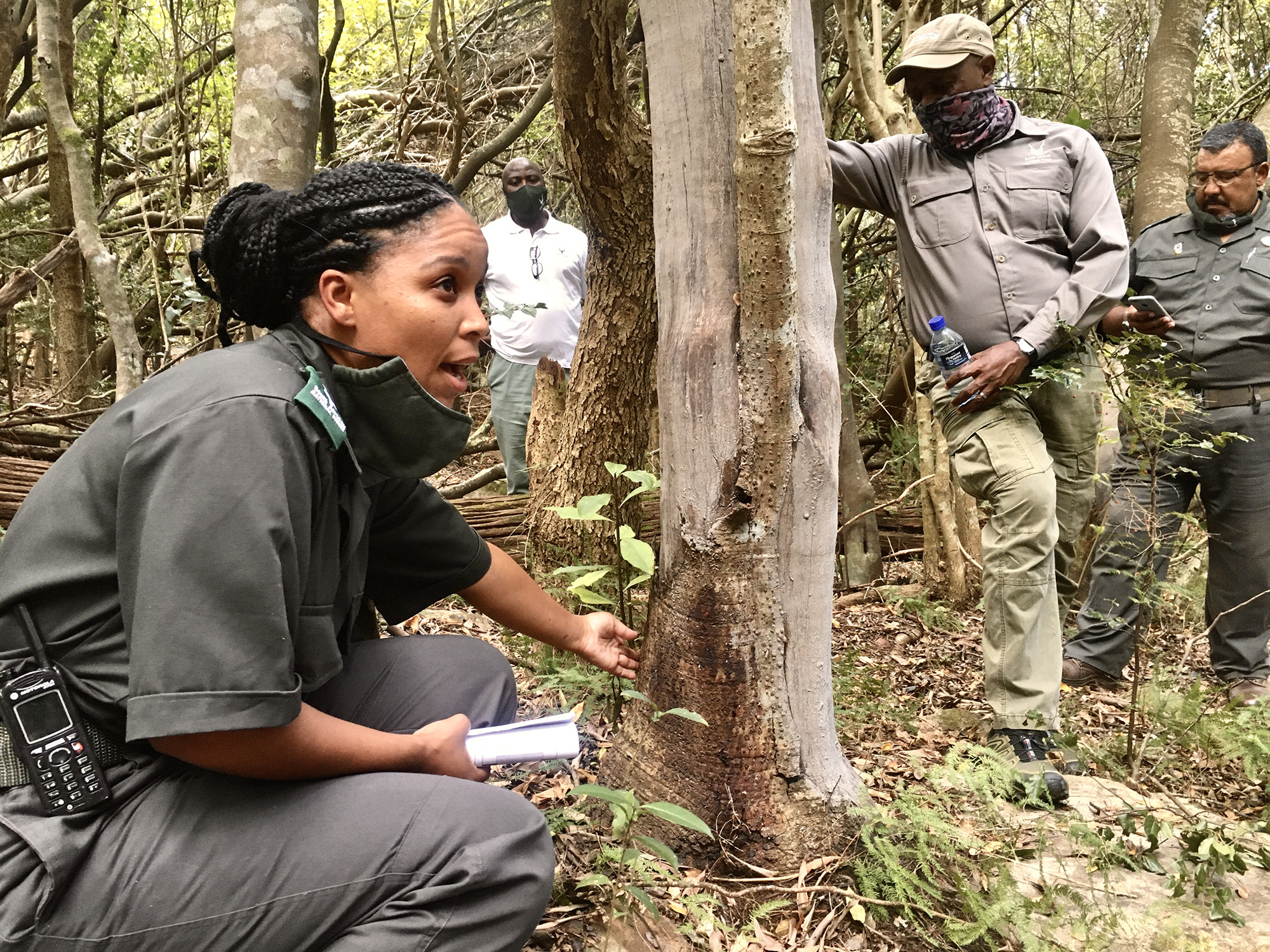
Wholesale bark-stripping, the practice of stripping a tree for its medicinal bark, is a form of poaching seeing a dramatic spike in the park’s Newlands forest section. Here ranger Chamell Pluim, who was recently involved in the arrest of three poachers, explains that witnessing the death of a bark-stripped tree ‘is like the death of a rhino’. (Photo: Tiara Walters)
Table Mountain ‘and other struggling parks’
Even so, SANParks’ critics point to something of a musth bull in the boardroom: the park’s financial allocations in non-pandemic years.
Schmidt further asks: “Creecy bailed out SANParks to the tune of R961-million in 2020. The big question is – where does the money go?”
Indeed, the minister’s parliamentary reply on Table Mountain’s income and expenses concedes that “SANParks has not made a calculation of [2018/19] income directly reinvested” in the park. She offered no further explanation. So Daily Maverick asked for details on how and when SANParks did spend Table Mountain’s R185-million in profit.
Batting away questions about Table Mountain’s budget allocations, SANParks Cape region manager Norman Johnson says he prefers to focus on “the impact of the financials”.
The Covid-19 pandemic has “knocked industries”. Tourism has “not materialised”, he says. SANParks would probably require another “bailout”.
In 2019/20, the park raked in a handsome R372-million. Only shy of R100-million – just a quarter of total revenue – was spent on operations, according to figures SANParks supplied to Daily Maverick. However, this fat year is followed by a wafer-thin 2020/21 forecast adjustment of little over R28-million, even as operation costs hovered at a sizeable R73-million.
As a result, Thakhuli now classifies the globally recognised park – which includes the Atlantic seaboard’s scenic thrills, southwesternmost point in Africa, and smallest but most diverse of Earth’s six floral kingdoms – with “other struggling parks”.
“Based on the decreased revenue in the current financial year it is quite clear that cross-subsidising from other parks that generated higher surplus revenue will need to cover operation costs for Table Mountain National Park and other struggling parks,” Thakhuli says. He did not specify which parks had generated a “higher surplus”.
“I’m sure that, one way or the other, SANParks will need a bailout in the next financial year based on our performance,” Johnson muses. It is “government’s key focus during difficult periods not to contribute to the unemployment rate”.
Yet, SANParks spokesperson Ike Phaahla says that the R961-million Covid-19 injection Creecy’s department had in 2020 transferred to the national parks entity was not a bailout.
“The minister had to adjust the Budget and then she decided to allocate R961-million to SANParks,” he explains. The nearly R1-billion in question, in other words, “was just an adjustment”.
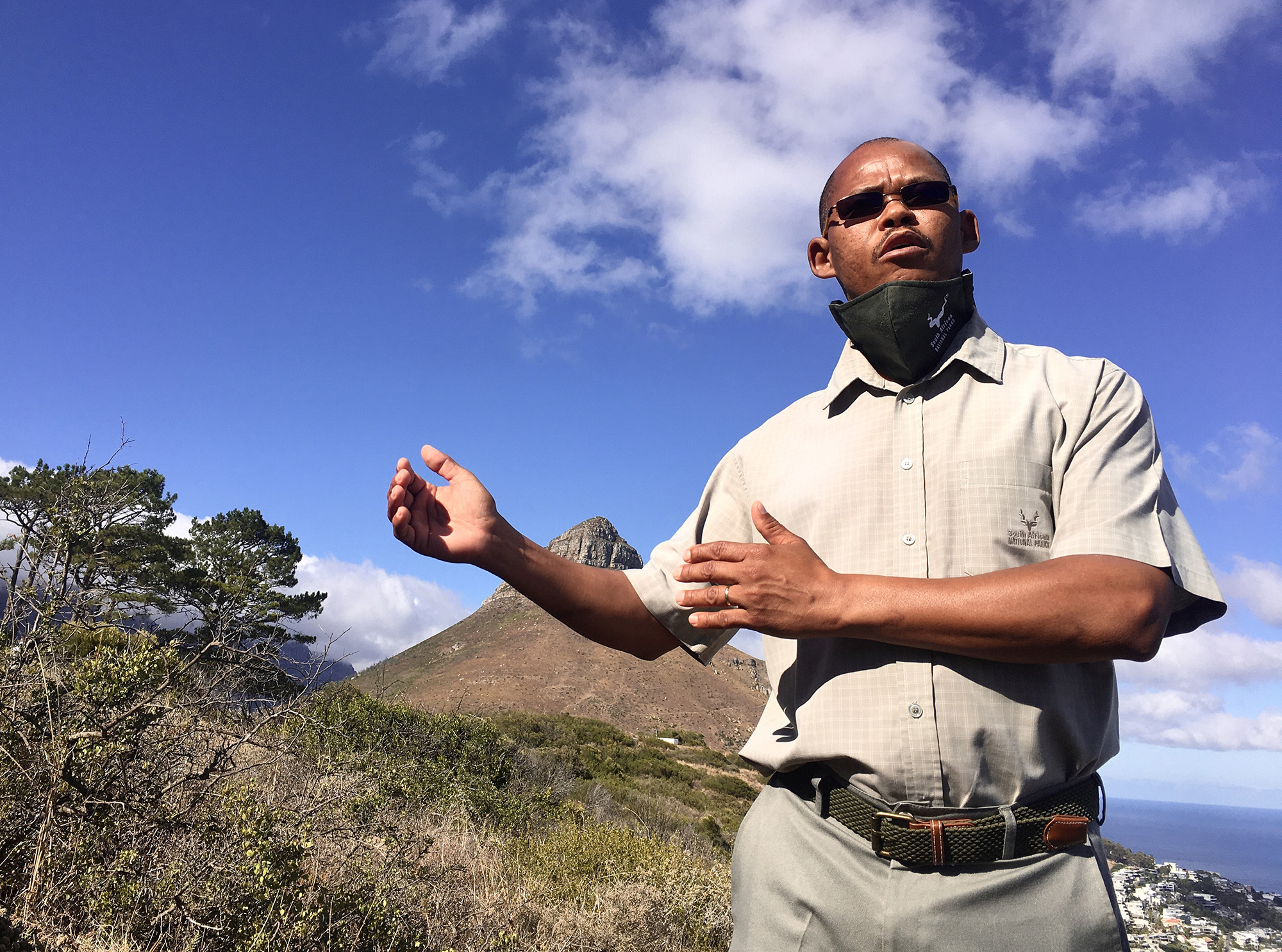
Table Mountain National Park manager Frans van Rooyen, recently appointed to the daunting position, talks about the challenges of running a reserve that requires surveillance by sea, air and high altitudes. Hikers’ favourite Lions Head looms over his shoulder. (Photo: Tiara Walters)
Cross-subsidies – a ‘justified weight’
The park’s surplus revenue was allocated to other national parks in 2019/20 and previous years, Thakhuli told Daily Maverick.
Explaining why, Thakhuli stresses the “developmental role that our national parks play in their surrounding communities and, with most national parks located in rural areas far from economic opportunities presented by urban centres, a principle of cross-subsidising carries a justified weight”.
SANParks “primarily funds itself”, generating more than 80% of its income from the majority of national parks – only 20% of funding is derived from government, Thakhuli says. “We also manage 370,000ha of marine-protected areas.”
Conservation, scientific research “and associated programmes” on climate change, overfishing and species survival are “core, non-income-generating activities … essential to maintaining the integrity” of conservation areas.
These things “cost money”, Thakhuli says, “and are funded by tourism revenue derived from parks that generate a surplus”.
‘Crime not only on the mountain’
Want to ride a horse? Your bike? Scale some rocks? Paraglide or hang glide? Fish? Walk your dog? On Table Mountain, there’s an activity permit for that. In the current year, dog-walking costs R320; rock-climbing (R480); and cycling (R660).
The permit charges would be welcome, the lobby coalition says, if only fees were sufficiently reinvested into park infrastructure. It concedes seeing a “noticeable improvement in trail maintenance”, but warns that “pedestrian traffic has increased dramatically … a constant and effective trail-maintenance programme, with a requisite budget to match, is required”.
Table Mountain Bikers (TMB), founded by local cyclist Robert Vogel, is a member-funded volunteer group helping to open and maintain trails. Vogel says it has worked with the cycling community to privately invest in trail maintenance, building and signage to the tune of R2-million. He told Daily Maverick it has also set up a non-profit organisation to “channel additional funds of R200,000 into a trail-safety project”.
“We’ve employed someone to walk the cycling trails three days a week and report suspicious incidents,” he says. “We’re about to employ a second person. This is our own initiative as a service to all users.”
Love Our Trails, a civilian corps, runs sponsored clean-ups for graffiti and litter. This community-organised initiative has removed at least 1,400kg of waste since its 2015 launch, founder Blake Dyason says.
In the face of the pandemic assailing park revenue, Schmidt contends, “volunteers are happy to offer skills, time and finances, but the onus should not be on user groups and stakeholders to foot the bill”.
It is one thing milking the “cash cow – quite another killing it”, Schmidt says, and throws the gauntlet on the doorstep of SANParks’ head office in Pretoria. “Given the way the park is crumbling, in many senses, I think it’s going to take something of a forensic audit.”
SANParks counters that it has invested some R35-million in renovations over six years, to be wrapped up in 2021; while Taahir Osman of hiking-safety volunteers Take Back Our Mountains argues that “sources” critical of the park’s finance allocations are “not that well informed”.
“I can’t see how a lot of money is being generated, especially in the current operations of Covid-19 with the lockdowns that we have had,” Osman says.
On safety and security, he suggests the park has gone beyond the call of its mandate – nature conservation – to protect users.
“Safety has never been their only responsibility,” he says, noting that this is the police’s job.
However, Section 24 of the Constitution enshrines everyone’s right to “an environment that is not harmful to their health or wellbeing” – thus nature reserves and national parks are enshrined as sanctuaries of safety for all recreational users.
“Of course, the tourist industry is important … So all means possible should be explored in keeping the parks safe for users.”
For Table Mountain, he says, upgrades have involved “extending” park “resources to include aspects of safety”. Park management is “doing the best it can based on its limited support and resources”.
The local safe-hiking campaigner contends that “much effort” has “gone towards establishing partnerships with a broad group of stakeholders”. He cites, among others, the honorary rangers programme, collaborative environment clean-ups and visible safety patrols.
“Crime is not only taking place on the mountain,” he argues. “There are horrific crimes occurring on the Cape Flats every day and this should be a concern to everyone.”
For its part, SANParks acknowledges that “forming of alliances are critical to the effective functioning” of the national parks entity.
To this end, the minister has ordered the creation of task teams to “deal with various issues”, including safety and security – although FoTM’s Davies, who sits on the safety and security task team, says progress has been painfully slow, citing just “three meetings in one year and no tangible results”.
Thakhuli attributes this to the “nationwide lockdown”, somewhat vaguely insisting that the “work of the various task teams” was “reinstated as of September”. He also credits the task teams with the decision to outsource “certain stakeholder-engagement processes”, such as the park forum demanded by the lobby coalition. This would be “fast-tracked” for an end April conclusion.
In the meantime, the park is held ransom by the pandemic’s ripple effects, while an unresolved cloud of irregular expenditure rumbles over Pretoria with a characteristic Highveld tincture. Recreational users – even when not alone in the park – still have to look over their shoulders. This is hardly a guarantee against lethally armed, and determined, criminals.
These issues may be just the tip of the 33,000ha berg and its porous borders, and the pressures of poverty weighing upon it.
Fire crews have extinguished multiple illegal “vagrant-caused” fires in various parts of the park in the current summer season. In 2019/20, some 90% of fires were contained within 90 minutes – but lately, shallow, overhanging caves have also attracted an influx of church groups holding illegal fire ceremonies, according to the park’s fire department. It says eviction has been a weak deterrent, because the groups keep returning.
The park’s chief security consultant, hard-boiled military man Otch Otto, says he is uncowed by these challenges – despite having to realise a R2-billion security vision while grappling with the often-murky behemoth of bureaucracy.
“We have politics and governments and stuff all around us while we try to do conservation and protect our people,” says Otto, retired national security chief of the Afghanistan presidential election, former mission manager in Kruger National Park’s poaching trenches, and mastermind behind about 15 joint-operation centres. “I’m not necessarily talking about the national park. This place must last forever.” DM168
This story first appeared in our weekly Daily Maverick 168 newspaper which is available for free to Pick n Pay Smart Shoppers at these Pick n Pay stores.




















 Become an Insider
Become an Insider
Usual cadre deployment problems, follow the money!
Just curious, maybe I missed this, is this a provincial problem or an ANC government problem?
With a large collection of units at various stages of their development, it is short-sighted to demand ring-fencing. There will always be important units that can by their location and potential never be self-sustaining. It does not make them unworthy of subsidization by the profitable ones.
Guess how much of that R660 Mtb permit is channeled back into trail building and maintenance? A big fat zero. In Tokai a volunteer organisation has to fundraise to do this. Sanparks has its cake and eats it (even though the MTB riders were there before it was even a national park)